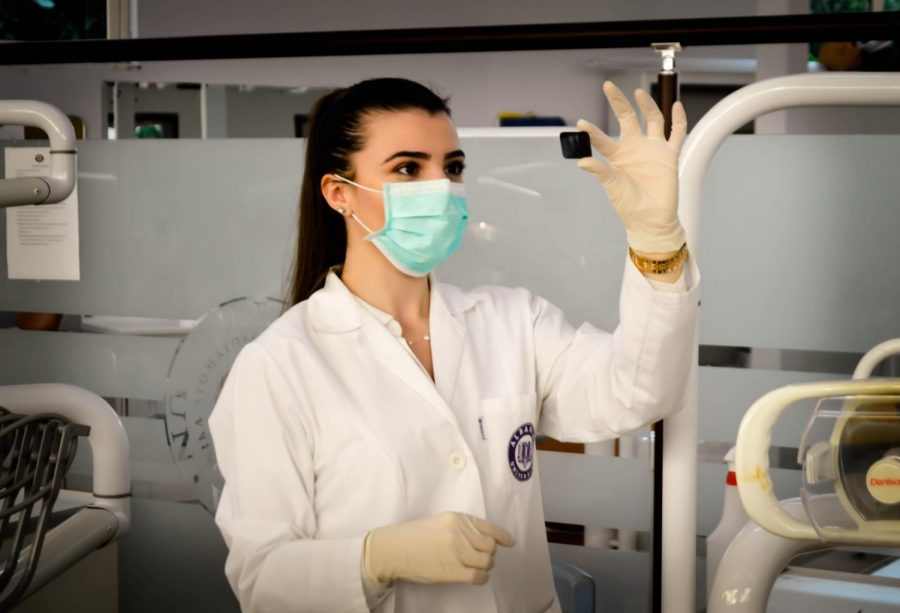Face Masks: Effective or Useless?
Here’s the Truth
Photo by Ani Kolleshi on Unsplash
Disposable face masks, such as the one the doctor in the photo is wearing, are increasing in demand as coronavirus rapidly spreads.
February 5, 2020
As 2019 Novel Coronavirus (2019-nCoV) begins to spread across the world, the demand for disposable face masks is skyrocketing. However, are they even effective in protecting people from the virus?
Coronavirus spreads, according to The Centers for Disease Control and Prevention (CDC), through the air, close personal contact, or touching an object or surface with the virus on it and then touching your mouth, nose, or eyes.
Experts say that disposable face masks, when used properly and in conjunction with frequent hand washing, can be effective in preventing the virus from spreading. However, they are not perfect.
There are two types of disposable face masks: cheap, disposable surgical masks and N95 respirators.
The Food and Drug Administration (FDA) says that cheap, disposable surgical masks “may be effective in blocking splashes and large-particle droplets,” but “does not filter or block very small particles in the air that may be transmitted by coughs, sneezes or certain medical procedures.” They also “do not provide complete protection from germs and other contaminants because of the loose fit between the surface of the face mask and your face.”
The CDC recommends N95 respirators for health care workers that are interacting with coronavirus patients.
The ‘N95’ designation, says the FDA, “means that when subjected to careful testing, the respirator blocks at least 95 percent of very small (0.3 micron) test particles. If properly fitted, the filtration capabilities of N95 respirators exceed those of face masks.”
But it is important to note that “even a properly fitted N95 respirator does not completely eliminate the risk of illness or death.” Another major flaw with N95 masks is that they “are not designed for children or people with facial hair and “may not provide full protection” to such people.
For either type of disposable face mask, it is important to both wear and remove the mask correctly, such as by being careful to avoid touching the outside surface and never reusing one.
While disposable masks may be useful in large crowds or in areas such as Wuhan, China, they are not necessary for places in the U.S. or in a home setting unless there is a patient at home. In fact, most people should avoid using them unless necessary to prevent a shortage.
The recent 2019 Novel Coronavirus (2019-nCoV) breakout is, unfortunately, causing a serious shortage of disposable face masks.
“From what I have heard, the mask shortage is much, much more severe than what the public knows,” Cao Jun, general manager of mask manufacturer Lanhine, told Reuters. “Almost all hospital workers nationwide are facing a huge shortage of masks, not just in Wuhan. That’s very terrible.”
While the factory only makes about 400,000 masks a day, the clients are demanding over 200 million a day. He added that his workers are being offered quadruple their usual wages to try and keep up with the demand.
Companies are, luckily, rallying together to try and meet the demand.
Reuters reported that “U.S. firms 3M and Honeywell International also issued statements saying that they would make every effort to ensure a continuous supply of masks during the holiday and that their official stores would not raise prices.” Similarly, popular Chinese E-commerce platforms “have also pledged to crack down on any vendors who might try to raise prices of masks and disinfectant products.”
Despite their efforts, however, The Washington Post reported “increases over five times the usual prices.”
Sarah Chen (12) agrees that “we should be letting the people who truly need face masks use them instead of using them ourselves, especially since there is a shortage.”
As the spread of coronavirus increasingly raises concerns across the globe, disposable face masks are part of a number of other protective practices—such as frequent hand-washing—that will hopefully slow the dangerous virus. While they are not entirely effective, The Washington Post sums up their purpose: “they are a flawed but valid line of defense.”





































